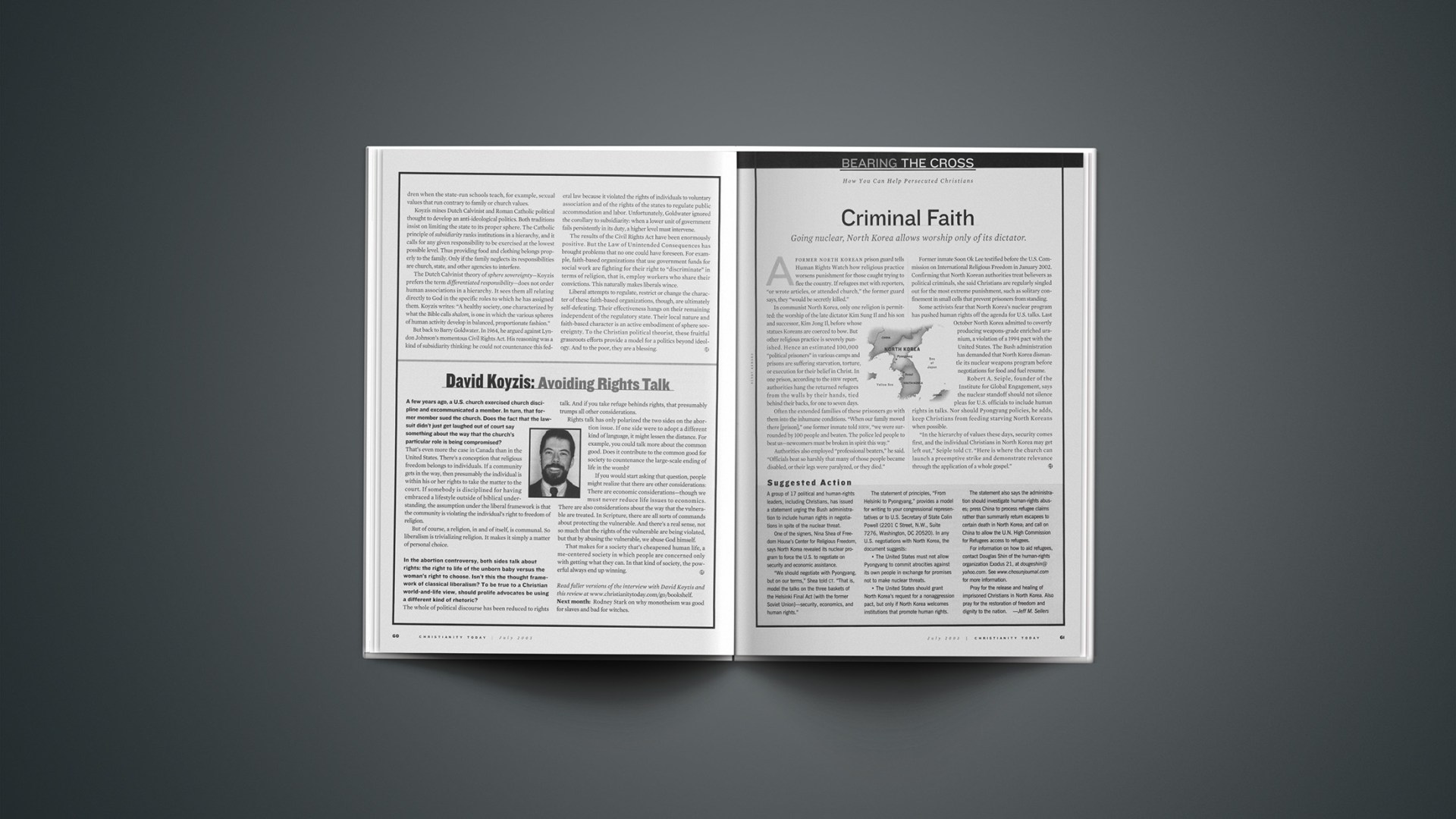A former North Korean prison guard tells Human Rights Watch how religious practice worsens punishment for those caught trying to flee the country. If refugees met with reporters, "or wrote articles, or attended church," the former guard says, they "would be secretly killed."
In communist North Korea, only one religion is permitted: the worship of the late dictator Kim Il Sung and his son and successor, Kim Jong Il, before whose statues Koreans are coerced to bow. But other religious practice is severely punished. Hence an estimated 100,000 "political prisoners" in various camps and prisons are suffering starvation, torture, or execution for their belief in Christ. In one prison, according to the HRW report, authorities hang the returned refugees from the walls by their hands, tied behind their backs, for one to seven days.
Often the extended families of these prisoners go with them into the inhumane conditions. "When our family moved there [prison]," one former inmate told HRW, "we were surrounded by 100 people and beaten. The police led people to beat us—newcomers must be broken in spirit this way."
Authorities also employed "professional beaters," he said. "Officials beat so harshly that many of those people became disabled, or their legs were paralyzed, or they died."
Former inmate Soon Ok Lee testified before the U.S. Commission on International Religious Freedom in January 2002. Confirming that North Korean authorities treat believers as political criminals, she said Christians are regularly singled out for the most extreme punishment, such as solitary confinement in small cells that prevent prisoners from standing.
Some activists fear that North Korea's nuclear program has pushed human rights off the agenda for U.S. talks. Last October North Korea admitted to covertly producing weapons-grade enriched uranium, a violation of a 1994 pact with the United States. The Bush administration has demanded that North Korea dismantle its nuclear weapons program before negotiations for food and fuel resume.
Robert A. Seiple, founder of the Institute for Global Engagement, says the nuclear standoff should not silence pleas for U.S. officials to include human rights in talks. Nor should Pyongyang policies, he adds, keep Christians from feeding starving North Koreans when possible.
"In the hierarchy of values these days, security comes first, and the individual Christians in North Korea may get left out," Seiple told CT. "Here is where the church can launch a preemptive strike and demonstrate relevance through the application of a whole gospel."
Copyright © 2003 Christianity Today. Click for reprint information.
Related Elsewhere
For more articles and resources, see Yahoo's full coverage area on the North Korea.
Previous Christianity Today articles on North Korea include:
Helping Refugees Run Roadblocks | No nation wants North Koreans, but Christians rally to their cause. (March 17, 2003)
Fleeing North Korea | Christians among the thousands making their way to China. (Oct. 7, 2002)
Persecution Summit Takes Aim at Sudan, North Korea | Christian leaders issue second "Statement of Conscience." (May 2, 2002)
South Koreans Help Neighbors (Aug. 9, 1999)
Famine Toll Exceeds 1 Million (Oct. 5, 1998)
Editorial: North Korea's Hidden Famine | The poor and the weak should not have to starve due to the policies of their government. (May 19, 1997)
Evangelicals Plead for Korean Aid (April 7, 1997)
Bearing the Cross focused on North Korea in 2001 as well.
Previous Bearing the Cross articles include:
Indonesia—April 2003
Nigeria—Feb. 2003
Egypt—Dec. 2002
Cuba—Oct. 2002
Turkmenistan—Aug. 2002
India—June 2002
Saudi Arabia—April 2002
Iran—March 2002
Vietnam—January 2002
Pakistan—Nov 2001
Laos—Oct, 2001
North Korea—Aug. 2001
Sudan—June 2001
Indonesia—April 2001
China—March 2001










